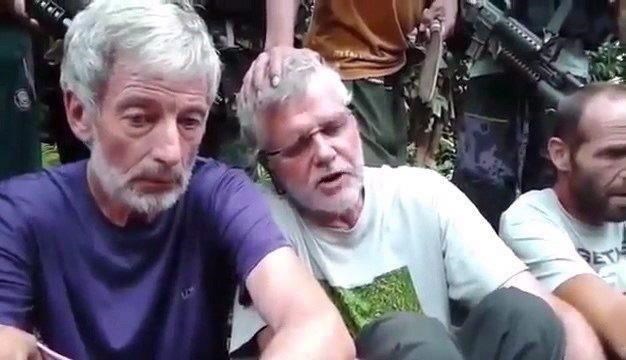
Canadians Robert Hall, left, and John Ridsdel are seen in this still image taken from an undated militant video. Relatives of Hall, whose expansive, romantic life was cut short by terrorists in the Philippines say that despite the tragic end to his story, they agree with Canada's policy of not paying ransom for hostages.
Image Credit: THE CANADIAN PRESS/HO via Youtube
June 16, 2016 - 7:00 AM
OTTAWA - Relatives of a Canadian man whose expansive, romantic life was cut short by terrorists in the Philippines say despite the tragic end to his story, they agree with Canada's policy of not paying ransom for hostages.
Robert Hall, an adventurous nomad in his late 60s who called his new home a paradise on earth, was captured by a militant group called Abu Sayyaf in September 2015 and was beheaded earlier this week after a deadline for a ransom payment passed.
In a statement distributed by the press gallery in Ottawa on Tuesday, Hall's family said the efforts to free him were "vast and exhaustive" but in the end, they agree with Prime Minister Justin Trudeau's directive that money not be paid to hostage takers.
"Our family, even in our darkest hour, agrees wholeheartedly with Canada's policy of not paying ransom to those who would seek to undermine the fundamental values with which my father lived his life," said the statement.
"We stand with the ideals that built this country: strength of character; resilience of spirit; and refusal to succumb to the demands of the wretched, in order to satisfy the bloodlust of the weak."
Strength and resilience were certainly part of Hall's own character. Described by his family as a self-made man who rose up from "the hardships of his own youth," he led a life many might envy.
Hall was born in Calgary but lived in various parts of Western Canada. He ran a series of businesses — a small engine repair shop, a pizza stand, a home renovation company, and a consulting firm — but spent 25 years at his custom welding and fabrication business.
Along the way he experienced many adventures, from building and competing with his own racecars to learning to become a pilot. A gifted athlete, he was a championship wrestler, played football and hockey, and coached soccer and hockey teams. Later in his life, he discovered archery, fencing, and sailing.
"A romantic to the very core, Robert believed in controlling his own destiny, and that hard work and a desire to succeed were the two main ingredients to any successful endeavour," said his family.
"He has been described as a `dreamer,' which he certainly was, but more than that he was an achiever. He didn’t sit around and dream about sailing the world; he got up and did it, made it happen."
They said he eventually moved out west and started living on a boat while pursuing part-time acting jobs, joking that he was "only a marlin trophy away from the full Hemingway."
While sailing and travelling around the world, Hall landed in the Philippines a couple of years ago. He told his family that the country's people were warm and gracious, its weather mild and that the port city of Davao, where he lived, was renowned for its safety.
Hall's beheading has been confirmed by the government of the Philippines, which called it a "brutal and senseless murder."
A militant video obtained by Philippine police officials showed Hall in an orange shirt and kneeling in front of a black Islamic State-style flag before he was killed in a jungle area.
His death came after the killing in April of fellow Canadian John Ridsdel, who was snatched from a marina by Abu Sayyaf along with Norwegian Kjartan Sekkingstad and a Philippines national last September.
Trudeau has steadfastly refused to entertain the thought of paying ransom to hostage takers. In the wake of Ridsdel's execution, he said Canada would never pay a ransom for the hostages in the Philippines, and last month persuaded leaders of the other G7 countries to reiterate their opposition to paying ransoms.
On Monday, he repeated that paying ransoms would put more Canadians in danger.
Abu Sayyaf operates mainly in the south of the Philippines, in the western Mindano and the Sulu Archipelago, but staged a major attack in 2004 that killed more than 100 people when militants bombed a ferry in Manila Bay.
In recent years, Philippines security forces have attacked Abu Sayyaf, killing senior leaders and arresting others, but they've been unable to end the group's kidnapping, extortion and terrorist activities.
Hall's family said they will persevere and that their thoughts are also with "the other families who continue to suffer through these circumstances."
"More importantly than the things he did, is the way he lived his life and the manner in which he impacted the people who knew him," they said.
"He believed in right and wrong, in doing the right thing even when it was difficult or no one was watching, and in helping people who couldn’t otherwise help themselves.
"He lived with the idea that you only had so much time — `only so many heartbeats,' as he put it — and it was important to do as much living as possible while you could."
News from © The Canadian Press, 2016